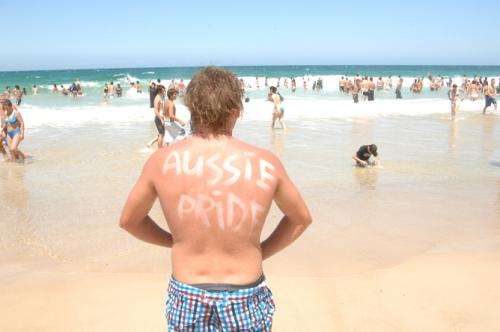Study finds slip, slop, slap message is slipping

Australians are becoming less attracted to having a suntan and fewer are being sunburned, but there's been less improvement in wearing sunscreen in recent years, according to new research from the Cancer Council.
The research, published in the Australian and New Zealand Journal of Public Health, compared data from a national survey of more than 6,000 people, with data going back to 2003.
It found the proportion of adults desiring a tan fell from 39% in 2003/4 to 27% in 2010/11, and those getting sunburned at the weekend fell by 5% during the same period.
Despite this, one in five adolescents and one in eight adults still reported getting sunburned, and hat use has actually decreased over time among adolescents and adults.
Research author Terry Slevin, who is chair of Cancer Council Australia's Skin Cancer Committee, wants more money to be spent on skin cancer prevention.
"The bottom line is we never see fast changes when it comes to public health."
Despite positive changes to behaviour, the number of skin cancers reported is increasing, from 412,493 in 1997 to 767,347 in 2010, according to the Medical Journal of Australia.
The Cancer Council says the cost of treating these cancers exceeds $500 million per year.
"We are spending huge amounts treating cancers that are preventable," Mr Slevin said.
"There's a clear economic rationalist argument, if you take the long term view, that this is an investment Australia can make where we can have a clear cost saving."
Rod Sinclair, professor of dermatology at Epworth Hospital said behavioural change is hard to achieve and hard to document.
"Until recently it was standard dogma that public education campaigns were a waste of money," Professor Sinclair said.
"The Cancer Council Victoria first challenged that dogma and have now produced evidence that people will respond to public education campaigns and can be taught to modify pleasurable activities to protect their health.
The change is slow. The change is incomplete. The change is easily forgotten if the public education dollars stop flowing. However the potential benefits to both the Australian people and the Australian government in terms of reducing skin cancer justify continuing public education."
Mr Slevin added that unlike anti-smoking campaigns and their simple "don't smoke" message, skin cancer prevention required a more sophisticated approach to target specific behaviours, such as sunscreen use or hat wearing.
"With sun protection there are continuous variables so it's a far more nuanced and subtle challenge that we face."
For example, Mr Slevin said men were an area of focus that required further attention.
"When you look at the trend in terms of skin cancer rates and the gap between men and women there's no doubt we need to focus on men."
The data shows one in 14 men are diagnosed with melanoma before the age of 85, compared with one in 23 women.
Professor Sandra Jones, director of the Centre for Health Initiatives at the University of Wollongong said health communication campaigns were often subject to a range of competing behaviours and messages.
For example, she cited public debates about the "safety" of sunscreen, and the recent focus on Vitamin D deficiency as two examples of messages that deter people from sun protection.
But Professor Jones added that health communication campaigns needed reinforcement to remain top of mind.
"What we are seeing are small gains as a result of ongoing public communication campaigns. If these campaigns do not continue, we will almost certainly see these gains reverse."
Professor Jones said health education campaigns do not work in isolation, and needed to be accompanied by other activities to address barriers to behaviour change.
She said such activities could include applying the "no hat no play" rule to secondary schools, ensuring school uniforms provide adequate sun protection, and monitoring changes in skin cancer incidence following the ban on tanning beds which comes into place in NSW next year.
This story is published courtesy of The Conversation (under Creative Commons-Attribution/No derivatives).















